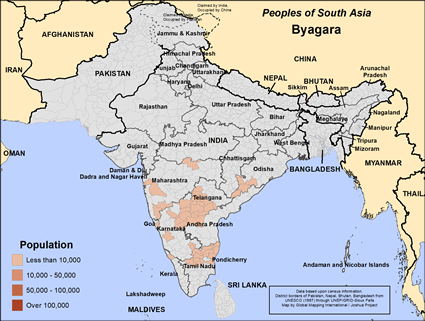The Byagara people have a long history in India, particularly in the southern regions. Traditionally, they have been known for their roles as hunters and gatherers. Over the centuries, they have adapted to changing environments and socio-economic conditions. The Byagara primarily speak Kannada, reflecting their regional heritage and cultural identity.
Today, the Byagara people live in rural and forested areas, engaging in agriculture, hunting, and gathering. They grow crops such as millet, rice, and vegetables and many families also rear livestock. Their communities are close-knit, emphasizing strong family bonds and mutual support. The Byagara maintain a vibrant cultural life, celebrating their heritage through local festivals, music and traditional arts.
The Byagara's eating practices involve a diet that includes both vegetarian and non-vegetarian food, featuring rice, lentils, vegetables and meat from hunting. They also enjoy traditional sweets and festive foods during celebrations.
The Byagara people distinguish themselves from other groups through their unique blend of agricultural practices and traditional hunting and gathering skills. Their deep knowledge of the forest and its resources sets them apart from neighboring communities. The Byagara place a strong emphasis on maintaining family unity.
Their wedding practices are elaborate and deeply rooted in Hindu tradition. Weddings typically include rituals such as the exchange of garlands, sacred fire ceremonies, and vibrant music and dance performances.
The Byagara people practice Hinduism, worshiping various deities and observing numerous religious rituals and festivals such as Diwali, Holi, and local harvest festivals. Their belief system emphasizes values like dharma (duty), karma (actions and consequences), and ahimsa (non-violence). They honor their ancestors through rituals and ceremonies, ensuring the transmission of their religious and cultural traditions across generations.
The Byagara people need better access to quality education to provide more opportunities for their children. Improved healthcare services are essential due to the limited availability of medical facilities and high rates of preventable diseases. Economic support through modern agricultural techniques, sustainable hunting practices, market access, and vocational training can enhance their livelihoods. Infrastructure development, including better roads, clean water supplies, and reliable electricity, will greatly benefit the Byagara community.
Pray for the Lord to provide for their needs in such a way they will thank him and give him glory and praise.
There are no Christ followers among the Byagara people, but they live in a part of India where there are some. Pray for Christ's ambassadors to fan out throughout southern India to disciple those willing to take Christ at his word.
Pray for an intense spiritual hunger that will drive Byagara leaders to seek and find the only savior, Jesus Christ.
Scripture Prayers for the Byagara in India.
Tribal Communities of South India, Ministry of Tribal Affairs, Government of India, 2016.
Sharma, B.K., "Cultural Heritage of Karnataka," Mittal Publications, 2012.
"Rural and Forest Development in India," Ministry of Rural Development, Governme
| Profile Source: Joshua Project |











